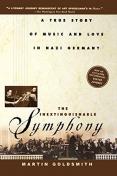BKMT READING GUIDES
The Inextinguishable Symphony: A True Story of Music and Love in Nazi Germany
by Martin Goldsmith
Paperback : 352 pages
2 clubs reading this now
0 members have read this book
Introduction
Editorial Review
Writing this book must have required enormous courage; reading it is overwhelming, especially for anyone personally connected to the events it describes. Martin Goldsmith, best known as the host of NPR's Performance Today, is the American-born son of two German-Jewish musicians who escaped the Holocaust. He anchors the Holocaust to the story of his own family, whom he never knew because most of them perished in Hitler's death camps. Goldsmith accompanies them through their lives in Nazi Germany, with its ever-tightening persecution and repression of the Jews, and on their nightmarish journey to the gas chambers. He follows his parents through their early musical training, their blossoming love, courtship, and marriage--making them seem like a normal, happy young couple--to their miraculous rescue and escape to America.The book's linchpin is the Jewish Culture Association ("Jüdische Kulturbund"), in whose Berlin orchestra his parents met. Established by prominent Jewish leaders in 1933, after a "purge" of all Jewish Civil Servants, the Kulturbund flourished for eight years, with the permission and under the constant, increasingly repressive surveillance of the Nazis, who exploited it as a propaganda tool. Spreading from Berlin to other cities, its musical and theatrical presentations, lectures, and films offered employment to thousands of Jewish artists and the only cultural oasis to its Jewish audiences. In 1941, Germany's preoccupation with the war and the "Final Solution" rendered it superfluous, and it was dissolved.
But Goldsmith also furnishes the proper historical context for his uniquely individual, human account of the 20th century's most inhuman period. After a chillingly detailed description of the grass-roots rise of Nazism, he focuses on particularly horrifying events: the infamous 1935 Nuremberg Laws and the devastating 1938 pogrom, "Kristallnacht." The tragedy of the 937 refugees, including Goldsmith's grandfather and uncle, who were refused disembarkation first in Cuba, then in Miami, illustrates the world's customary indifference to "other" people's misfortunes. Nobody paid attention when, as early as 1922, Hitler declared that his first priority on coming to power would be the extermination of the Jews.
Goldsmith's factual, reportorial style increases the sickening horror, and he reminds us frequently that he is writing about his own family. Though his story's outcome is never in doubt, he generates real suspense--a measure of his skill, despite his unfortunate habit of hinting at the future. The Kulturbund has been accused of encouraging the Jews to ignore the desperate circumstances outside the theater, and therefore the imminence of their danger. Goldsmith refutes this. For most of them, emigration was impossible because, apart from the natural fear of pulling up roots, leaving everything behind, and starting a new life, they had nowhere to go. Moreover, how could anyone foresee the depth of the impending horror? It was, and still is, beyond the human imagination.
Goldsmith writes with insight and aching honesty about the survivors' guilt and its numbing effect even upon the next generation. But his parents also taught him to love music and appreciate its meaning in people's lives, and he talks about it with real knowledge and understanding. (However, someone should have corrected his opening reference to Siegmund's sword in Die Walküre, which is made of steel, not gold.) This is a brilliantly written, important, unforgettable book. --Edith Eisler
Discussion Questions
No discussion questions at this time.Book Club Recommendations
Recommended to book clubs by 0 of 0 members.
Book Club HQ to over 90,000+ book clubs and ready to welcome yours.
Get free weekly updates on top club picks, book giveaways, author events and more








